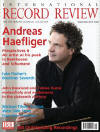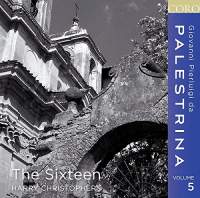Texte paru dans: / Appeared in:
*

International Record Review - (09//2014)
Pour
s'abonner / Subscription information
Coro
COR16124

Code-barres / Barcode : 0828021612428
The Sixteen continues its traversal of Palestrina with a fine collection
centred on the theme of Pentecost, thus providing the perfect opportunity to
set the tone with the magnificent Dum complerentur, surely one of the
most joyous responses to this particular liturgical feast ever conceived.
The singers certainly sound as though they are enjoying it, as indeed they
do all the music on this disc. It is followed by Loquebantur variis
Iinguis, a setting for more modest resources that is nevertheless
similarly inspired and grippingly performed, and the sequence Veni
creator Spiritus, the odd verses of which are set polyphonically, and
which make constant and inventive use of the chant melody.
The Missa 'lam Christus astra ascenderat', published in 1590 in the Missarum Liber Quintus, is not really one of Palestrina's best known Mass settings, but this recording may change all that. It is prefaced by the chant melody on which it is based ‑ again, the melody permeates Palestrina's polyphony to a remarkable degree, leading one to suppose, as Martyn Imrie points out in his informative booklet notes, that the composer must have been very fond of it. Again, The Sixteen clearly relishes this music (to the point, in fact, of a few rough edges in the singing of the tenors and basses), and makes a very good case for it becoming as popular in performance as some of the better‑known settings. I'd prefer a slightly faster pace in the 'Gloria' and 'Credo', but this is certainly a minor quibble; the recording was made in St Alban's, Holborn, a venue not renowned for the dryness of its acoustics.
The
final Pentecost‑themed work on this disc is the superb Veni Sancte
Spiritus, in which Palestrina makes splendid use of two choirs, one of
higher and one of lower voices. It is followed by a set of three motets from
the Song of Songs collection and a fine four‑voice Magnificat
quarti toni. I tend to prefer the Song of Songs settings
when sung by smaller ensembles, but they work very well here, and it is
certainly true that a larger ensemble can bring another perspective to bear
on these enigmatic, intimate works ‑ Surge, propera is
particularly effective.
Fermer la fenêtre/Close window
Cliquez l'un ou l'autre
bouton pour découvrir bien d'autres critiques de CD
Click either button for many other reviews


